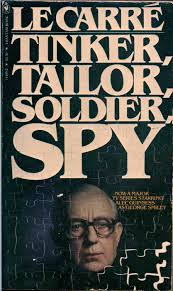 The monstrosity of this, reaching Smiley through a thickening wall of spiritual exhaustion, left him momentarily speechless
The monstrosity of this, reaching Smiley through a thickening wall of spiritual exhaustion, left him momentarily speechless
― John le Carré, Tinker, Tailor, Soldier, Spy
His real name is David John Moore Cornwell
There was a murky gray light coming into the room under the window blinds. Cecilia opened one eye, and quickly closed it again. Her head pounded; her mouth felt as though it were stuffed with cotton wool. She tried to lift her head from the pillow, with an aching pain shooting up from her shoulders to her neck. Finally, she was able to roll sideways and make it to her feet. She staggered into the bathroom, splashed cold water on her face and looked in the mirror. A haggard, disoriented visage stared back at her. She took her hand, rubbed it in a circle on her nose, and then scratched its end. She peed, turned on the shower, and hoped for a miracle, because it was going to require that for her to continue on with the day’s activities.
The shower made minimal progress in reviving Cecilia, so she put on some cotton slacks, long-sleeved t-shirt, her hooded, black sweater and leather Keds and took the elevator down to the breakfast room. A pot of coffee and  pumpernickel toast with sausage and eggs heaped onto it helped her begin to feel at least subhuman. She went back to her room, brushed her hair, put on some lipstick and sat on the edge of the bed. She needed to send Dr. K an e-mail explaining her activities for the morning. Pressing each key was like dull stabbing into her fingertips. She thought to herself, “I’ve got to get some kind of sleep aid at the pharmacy after I visit Olga at the nursing home. A good night’s sleep is all I need to feel better. She pressed the “Send” button, closed the laptop, returned it to its bag, put it in her suitcase, and zipped it up. She didn’t think she’d need it for her conversation with Olga, as undoubtedly that conversation would put an end to this line of possible explanations for the missing data.
pumpernickel toast with sausage and eggs heaped onto it helped her begin to feel at least subhuman. She went back to her room, brushed her hair, put on some lipstick and sat on the edge of the bed. She needed to send Dr. K an e-mail explaining her activities for the morning. Pressing each key was like dull stabbing into her fingertips. She thought to herself, “I’ve got to get some kind of sleep aid at the pharmacy after I visit Olga at the nursing home. A good night’s sleep is all I need to feel better. She pressed the “Send” button, closed the laptop, returned it to its bag, put it in her suitcase, and zipped it up. She didn’t think she’d need it for her conversation with Olga, as undoubtedly that conversation would put an end to this line of possible explanations for the missing data.
Cecilia went downstairs to the  concierge desk, and asked the person behind the counter for the best way to reach the nursing home, located in Lyubertsy, about 14 miles to the southeast. The concierge said there were two ways to get there. Either take the subway to the Kuznetsky Most station, and then a cab to Lyubertsy, or a taxi the entire way. When Cecilia asked the cost of each, she was told the costs were about equal. She decided she was in no shape to try to navigate the Metro, so she asked the concierge to call her a cab. With a quizzical expression on his face, he pointed at the front door. A line of cabs sat there, waiting for a fare. She nodded, said “pasib”, the Russian word for thanks, and walked outside to get into the first cab. She gave the driver the address in Lyubertsy, put her card the government gave her up to the scanner to deduct the fare, and they were off. Forty minutes later, they were pulling up to the front of the building, which Cecilia recognized from the Google Maps inset picture. She got out of the cab, shaking her head to try to clear her thoughts, and walked into the reception area.
concierge desk, and asked the person behind the counter for the best way to reach the nursing home, located in Lyubertsy, about 14 miles to the southeast. The concierge said there were two ways to get there. Either take the subway to the Kuznetsky Most station, and then a cab to Lyubertsy, or a taxi the entire way. When Cecilia asked the cost of each, she was told the costs were about equal. She decided she was in no shape to try to navigate the Metro, so she asked the concierge to call her a cab. With a quizzical expression on his face, he pointed at the front door. A line of cabs sat there, waiting for a fare. She nodded, said “pasib”, the Russian word for thanks, and walked outside to get into the first cab. She gave the driver the address in Lyubertsy, put her card the government gave her up to the scanner to deduct the fare, and they were off. Forty minutes later, they were pulling up to the front of the building, which Cecilia recognized from the Google Maps inset picture. She got out of the cab, shaking her head to try to clear her thoughts, and walked into the reception area.
She identified herself and said she wanted to speak with Olga Arkhipov. The person behind the desk asked if she were a relative. Without thinking, Cecilia said “no – do I have to be?” She immediately sensed that her testy tone was not earning her any points with the receptionist. Cecilia quickly said, “I am a relative of a close comrade of Vasili’s – her husband?” The receptionist looked dubious, but placed the call to someone and spoke quick Russian. She hung up, and said, “Mrs. Arkhipov’s room is in “C” wing, on the second floor. The elevator will take you there. She pointed to her right.
Cecilia took the elevator and quickly found “C” wing. She spoke to a nurse behind the desk at the entrance to the wing, and again asked for Olga Arkhipov. The nurse took her to a room that overlooked a wide terrace and some  aspen trees surrounding the broad grass sward on the terrace’s far side. A
aspen trees surrounding the broad grass sward on the terrace’s far side. A 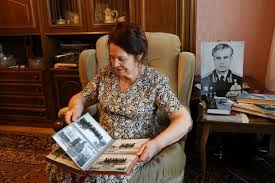 woman in her mid-eighties was sitting at a table, looking out the window at the view. A picture of Vasili in his uniform was on the table beside her chair. The nurse left, and Cecilia approached the woman. She began to speak to her, introducing herself and indicating why she’d come. The woman listened patiently, nodding, and then said something indistinguishable in Russian. Cecilia quickly realized Olga spoke no English. “Oh, wonderful,” she thought, “I should have realized she’d have no reason to speak anything other than Russian.”
woman in her mid-eighties was sitting at a table, looking out the window at the view. A picture of Vasili in his uniform was on the table beside her chair. The nurse left, and Cecilia approached the woman. She began to speak to her, introducing herself and indicating why she’d come. The woman listened patiently, nodding, and then said something indistinguishable in Russian. Cecilia quickly realized Olga spoke no English. “Oh, wonderful,” she thought, “I should have realized she’d have no reason to speak anything other than Russian.”
Cecilia walked back to the desk, and asked the nurse if there was anyone available that could assist her with translation in speaking to Olga. The  nurse stared at her for a moment, and then asked the obvious question: “If you know Olga enough to come visit her, why is it you didn’t know she couldn’t speak English?” For a moment, Cecilia was both too exhausted to think, and beginning to feel the onset of hyperventilation. She asked the nurse if she could sit down for a moment, and the nurse pointed at a chair. Gathering her wits about her, Cecilia decided the best way to address the question was to tell the truth. “My name is Cecilia Vasquez. I am an American cosmologist, working with Dr. Nikolai Kardashev on a matter of utmost importance to science. I am looking for some information from Olga about her husband’s work with the Russian navy many years ago. It is a question that Dr. Kardashev and I need for our research. While I do not know Mrs. Arkhipov personally, I just need to speak with her to clear up some questions surrounding some missing data.” Cecilia looked hopefully at the nurse, who seemed mollified by her response. But the nurse’s face tightened again, and she asked “There are no issues of national security involved in your questions, are there?” Cecilia’s chin was beginning to droop into her neck, but she held her head up, and shook it, no. The nurse asked, “Are you quite all right, miss?” I have to say you really do not look well.” Cecilia replied that jet lag had greatly affected her, and that as soon as she and Olga finished their conversation, she was going straight back to her hotel for a rest. Finally, the nurse asked Cecilia, “If you are working with Dr. Kardashev, why didn’t he come with you to translate?” Cecilia replied that he was currently suffering from gout, which had affected his ability to easily get around. The nurse just shook her head, and said, “This is a nursing home, not the
nurse stared at her for a moment, and then asked the obvious question: “If you know Olga enough to come visit her, why is it you didn’t know she couldn’t speak English?” For a moment, Cecilia was both too exhausted to think, and beginning to feel the onset of hyperventilation. She asked the nurse if she could sit down for a moment, and the nurse pointed at a chair. Gathering her wits about her, Cecilia decided the best way to address the question was to tell the truth. “My name is Cecilia Vasquez. I am an American cosmologist, working with Dr. Nikolai Kardashev on a matter of utmost importance to science. I am looking for some information from Olga about her husband’s work with the Russian navy many years ago. It is a question that Dr. Kardashev and I need for our research. While I do not know Mrs. Arkhipov personally, I just need to speak with her to clear up some questions surrounding some missing data.” Cecilia looked hopefully at the nurse, who seemed mollified by her response. But the nurse’s face tightened again, and she asked “There are no issues of national security involved in your questions, are there?” Cecilia’s chin was beginning to droop into her neck, but she held her head up, and shook it, no. The nurse asked, “Are you quite all right, miss?” I have to say you really do not look well.” Cecilia replied that jet lag had greatly affected her, and that as soon as she and Olga finished their conversation, she was going straight back to her hotel for a rest. Finally, the nurse asked Cecilia, “If you are working with Dr. Kardashev, why didn’t he come with you to translate?” Cecilia replied that he was currently suffering from gout, which had affected his ability to easily get around. The nurse just shook her head, and said, “This is a nursing home, not the  United Nations. We really aren’t sufficiently staffed to do our jobs and work as translators too.”
United Nations. We really aren’t sufficiently staffed to do our jobs and work as translators too.”
Cecilia sighed, nodded to the nurse and realized her only option was to contact Dr. K. She pulled out her cellphone and dialed his number, including the country code. The call went through, and Tatiana answered. Cecilia said, “Hello, Tatiana. I left so hurriedly last night, I did not get a chance to thank you for that excellent meal. I really appreciated all your efforts to make me feel at home.” Tatiana replied, “You are more than welcome, particularly since it’s now clear that we are family!” Cecilia agreed, and then asked, “Is Nikolai at home?” Tatiana replied, “I’m afraid he’s gone to the doctor to get an IV infusion of ![]() Krystexxa, the only medication that works for his severe gout. He should be back after lunch. Is there something I can help you with?” Cecilia explained that she’d read Nikolai’s manuscript, and was exploring a possible explanation for the missing data. Unfortunately, she needed to speak with someone who spoke no English, and she was hoping he could translate. Tatiana replied, “I am familiar with the missing data from the manuscript. Would I be of service in translating for you? My English is quite good.” Cecilia hesitated for a moment, but then realized Tatiana knew everything about the missing data, as well as her mission for the government. “That would be wonderful – but I’m not in Moscow at the Moment. I’m in Lyubertsy.” Tatiana said, “That’s not a problem – coincidentally, I was born and raised there. Where exactly are you?” Cecilia gave her the address, and before she could finish speaking, Tatiana said “Oh, I think that’s a nursing home now, am I correct?” Cecilia affirmed that she was. Tatiana said she would be there in 40 minutes.
Krystexxa, the only medication that works for his severe gout. He should be back after lunch. Is there something I can help you with?” Cecilia explained that she’d read Nikolai’s manuscript, and was exploring a possible explanation for the missing data. Unfortunately, she needed to speak with someone who spoke no English, and she was hoping he could translate. Tatiana replied, “I am familiar with the missing data from the manuscript. Would I be of service in translating for you? My English is quite good.” Cecilia hesitated for a moment, but then realized Tatiana knew everything about the missing data, as well as her mission for the government. “That would be wonderful – but I’m not in Moscow at the Moment. I’m in Lyubertsy.” Tatiana said, “That’s not a problem – coincidentally, I was born and raised there. Where exactly are you?” Cecilia gave her the address, and before she could finish speaking, Tatiana said “Oh, I think that’s a nursing home now, am I correct?” Cecilia affirmed that she was. Tatiana said she would be there in 40 minutes.
Tatiana arrived in 30, apparently possessing the same kind of lead foot in her driving as Cecilia. Cecilia had told her to come to “C” wing, and with no difficulty at the downstairs reception area, Tatiana came there to assist in her conversation with Olga. As they entered the woman’s room, Olga was still sitting at the table. She appeared to be holding a scrapbook of some kind. Cecilia quickly worried that maybe Olga had dementia, making this a waste of time for both Tatiana and her. But once pleasantries were exchanged, it was clear that Olga was still quite rational, and had no reservation about speaking with her, through Tatiana.
Cecilia began by introducing herself, and Tatiana as Mrs. Kardashev. Tatiana translated the introduction, after which Olga nodded at both of them, saying nothing. Cecilia went on, saying that she and Tatiana were there looking for her help in clearing up a mystery. Tatiana spoke in clear, unhurried Russian, and again Olga nodded, with an expectant look on her face. Cecilia then began to speak hurriedly, both because of her exhaustion as well as her fear that Olga was not going to share anything and she wanted to get this over with. “I am here to speak with you about your husband, 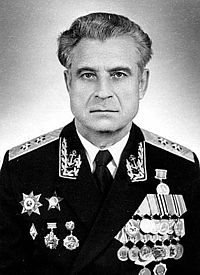 Vasili,” Cecilia pointed at the picture on the table. Tatiana shared her words in Russian. Cecilia continued. “I know your husband is a great hero, not only to the Soviet…” Cecilia hastily changed that to “Russia, but he’s also a hero to the world for his brave actions in the Cuban missile crisis.” Tatiana quickly translated, and Olga’s eyes grew wide, but still she did not speak, but just nodded. Cecilia then decided to just dive in with the problem and hope for the best. “Tatiana’s husband, Dr. Nikolai Kardashev, wrote a manuscript about astronomy and gathered some data from various observatories. On the day that your husband saved the world from nuclear war, October 27, 1962, the data is missing from the observatories in both Miami and Havana. We are just trying to find out if any events in Cuba on that day had anything to do with information being missing.” Tatiana tried her best to translate, but Cecilia figured it was way too much to convey to the old woman, and Tatiana was editing as she spoke.
Vasili,” Cecilia pointed at the picture on the table. Tatiana shared her words in Russian. Cecilia continued. “I know your husband is a great hero, not only to the Soviet…” Cecilia hastily changed that to “Russia, but he’s also a hero to the world for his brave actions in the Cuban missile crisis.” Tatiana quickly translated, and Olga’s eyes grew wide, but still she did not speak, but just nodded. Cecilia then decided to just dive in with the problem and hope for the best. “Tatiana’s husband, Dr. Nikolai Kardashev, wrote a manuscript about astronomy and gathered some data from various observatories. On the day that your husband saved the world from nuclear war, October 27, 1962, the data is missing from the observatories in both Miami and Havana. We are just trying to find out if any events in Cuba on that day had anything to do with information being missing.” Tatiana tried her best to translate, but Cecilia figured it was way too much to convey to the old woman, and Tatiana was editing as she spoke.
Finally, there was silence. Olga looked at both she and Tatiana, and then began to speak slowly. Tatiana translated her words as they formed ideas and sentences. This is what she said. “Yes, I recall what happened on that day in 1962. Vasili told me everything.” Olga paused. “Vasili never was the one that spoke about the incident. It was another crew member, Vadim Orlov, that told everyone what he thought had happened. By then Vasili was dead, so it wouldn’t have mattered to him. No one asked me about it, and if they had I would have remained silent. But now you have come to ask, and I will tell you what Vasili told me.
They had been submerged for 4 days off the coast of Cuba, in the 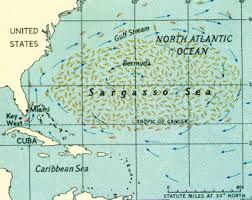 Sargasso Sea. They were part of a fleet of diesel submarines that made up Operation Anadyr. After four days of sitting and waiting there, the temperatures in the engine room were hovering at more than 54 degrees Celsius.” Cecilia laboriously worked the math in her head to determine that was 130 degrees Fahrenheit. Olga continued. “The men were frightened. They were not sure what to do. They were waiting for instructions from Moscow that never came.
Sargasso Sea. They were part of a fleet of diesel submarines that made up Operation Anadyr. After four days of sitting and waiting there, the temperatures in the engine room were hovering at more than 54 degrees Celsius.” Cecilia laboriously worked the math in her head to determine that was 130 degrees Fahrenheit. Olga continued. “The men were frightened. They were not sure what to do. They were waiting for instructions from Moscow that never came. 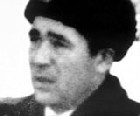 Captain Savitsky was a very temperamental man, and very ambitious. He did not want to have his career ruined by doing the wrong thing. So when the Americans started dropping bombs on the submarine, Captain Savitsky ordered the torpedo with the nuclear tip to be fired at the American ships. Olga stopped, and reached for the glass of water next to the picture of Vasili. She took a sip, and softly patted his face under the glass. “Vasili said he tried to convince the Captain not to fire the missile. He knew it would start a nuclear war, and nobody would emerge victorious from such a terrible mistake. But the political officer was also afraid for his career, and with the heat and fear, he agreed with the captain. Before he could stop them, Vasili said they fired the torpedo.”
Captain Savitsky was a very temperamental man, and very ambitious. He did not want to have his career ruined by doing the wrong thing. So when the Americans started dropping bombs on the submarine, Captain Savitsky ordered the torpedo with the nuclear tip to be fired at the American ships. Olga stopped, and reached for the glass of water next to the picture of Vasili. She took a sip, and softly patted his face under the glass. “Vasili said he tried to convince the Captain not to fire the missile. He knew it would start a nuclear war, and nobody would emerge victorious from such a terrible mistake. But the political officer was also afraid for his career, and with the heat and fear, he agreed with the captain. Before he could stop them, Vasili said they fired the torpedo.”
Cecilia and Tatiana looked at one another. Before they could ask Olga any questions, she continued on, likely anticipating their incredulity at her revelation. “Yes, I know what you’re going to say. You will say that is impossible. Vasili and I talked this over many times. He was a great naval officer, and knew how everything worked on the submarine. He knew the torpedo was launched. He said the Captain ordered them to dive immediately, to avoid the blast when it rebounded back to them. They went as low as possible, about 300 meters. But still there was a huge blast that fiercely rocked the submarine. Vasili said he also heard the explosion through the sonar man’s headphones. The submarine buffeted about and finally came to rest on the bottom. After two hours, and hearing and feeling nothing more, they rose to the surface. Through the periscope, Vasili could see fires burning near and far in both directions. They checked the radio, and there was nothing but static, where before there was mambo music from Havana. There were no ships, no planes – nothing. They were sure that nuclear war had begun. But who was winning? There was no way to tell in that eerie silence. While they were on the surface, Vasili took this 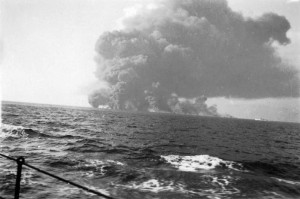 picture.” Olga turned several pages in the scrapbook, and turned the book toward Tatiana and Cecilia. They looked at the photo. Cecilia began to feel faint and ill.
picture.” Olga turned several pages in the scrapbook, and turned the book toward Tatiana and Cecilia. They looked at the photo. Cecilia began to feel faint and ill.
Olga continued, with Tatiana’s translation. “The Captain ordered the submarine to dive once again, lest the bombs start anew. They were nearly out of power, but still they stayed down there the rest of the day and night. The next morning, they had to surface or they would die from the heat and lack of battery power to operate the ship. They rose to the surface, and found themselves face to face with a pursuing American ship. That ship and the rest of the American fleet was intact. They looked around and saw several additional American ships on the horizon, and American planes in the air. They were dumbfounded! What had gone wrong, they wanted to know. Had the torpedo malfunctioned? Were the Americans capable of disabling the torpedo before it exploded? But what about the fires in each direction? They did not know what to think.
The American ship signaled that the submarine was to leave the area immediately, or it would be boarded and then towed to the naval station at Key West. Vasili replied that they would leave, as soon as they had sufficient battery power. Within 6 hours, they began their return voyage to the submarine base at  Vladivostok, unimpeded by the Americans.
Vladivostok, unimpeded by the Americans.
When they emerged from the submarine in Vladivostok, they were treated as though they had failed in their mission. One admiral said it would have been better if they had fired their missiles, rather than be defeated. There was much confusion, as it was obvious that the torpedo they fired had failed. But Vasili was absolutely sure that it had been launched, and sure that it caused a nuclear blast. But he and the rest of the crew were afraid that they would be in even more trouble if they told the truth about what had happened. They all agreed to maintain silence, but one of the crew spoke of it after Vasili died. But he did not tell the truth. Orlov said Vasili stopped the launch. But he did not. He died in 1998 from the radiation poisoning that occurred when they surfaced the sub and radiation got into the air system. The authorities in Moscow blamed his radiation poisoning on the K-19 incident, but he and I knew the truth.”
By this point, Cecilia knew that Olga was relating exactly what had happened. All the facts pointed to such an event. But her rational mind kept saying it was impossible…impossible…impossible. Cecilia could stand it no more. She rose from her chair, saying that she wasn’t feeling well. But before she took the second step, she collapsed to the floor, hitting her head on the corner of the table as she fell. The last thought in her mind was of her grandfather, and his testimony that day at Abuela’s about seeing the nuclear destruction in Havana. She now knew what her grandfather experienced was not a dream.
